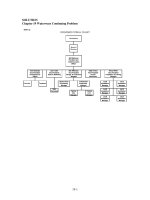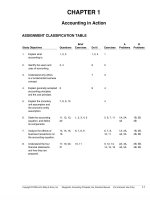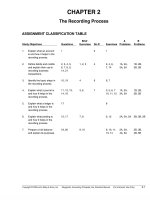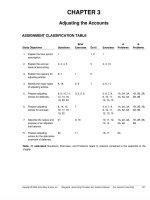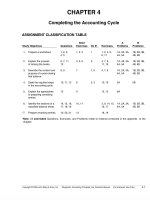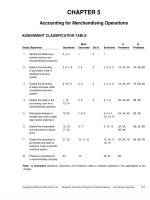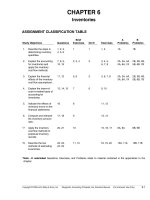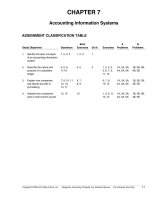Solution manual accounting principles 9e by kieso kimmel chapter 03
Bạn đang xem bản rút gọn của tài liệu. Xem và tải ngay bản đầy đủ của tài liệu tại đây (481.13 KB, 82 trang )
To download more slides, ebook, solutions and test bank, visit
CHAPTER 3
Adjusting the Accounts
ASSIGNMENT CLASSIFICATION TABLE
A
Problems
B
Problems
5, 6, 7, 8,
9, 10, 11,
12, 13, 15
1A, 2A, 3A,
4A, 5A, 6A
1B, 2B, 3B,
4B, 5B
7
5, 6, 7, 8,
9, 10, 11,
12, 13, 15
1A, 2A, 3A,
4A, 5A, 6A
1B, 2B, 3B,
4B, 5B
21
9, 10
10, 11, 12,
13, 14
1A, 2A, 3A,
5A, 6A
1B, 2B, 3B,
5B
22
11
16, 17
6A
Study Objectives
Questions
*1.
Explain the time period
assumption.
*2.
Brief
Exercises
Do It!
Exercises
1
1, 2
1
Explain the accrual
basis of accounting.
2, 3, 4, 5
5
2, 3, 10
*3.
Explain the reasons for
adjusting entries.
6, 7
1
6
*4.
Identify the major types
of adjusting entries.
8, 18
2, 8
7
*5.
Prepare adjusting
entries for deferrals.
8, 9, 10, 11,
12, 13, 18,
19, 20, 23
3, 4, 5, 6
*6.
Prepare adjusting
entries for accruals.
8, 14, 15,
16, 17, 18,
19, 20
*7.
Describe the nature and
purpose of an adjusted
trial balance.
*8.
Prepare adjusting
entries for the alternative
treatment of deferrals.
4, 6, 11
*Note: All asterisked Questions, Exercises, and Problems relate to material contained in the appendix to the
chapter.
Copyright © 2009 John Wiley & Sons, Inc.
Weygandt, Accounting Principles, 9/e, Solutions Manual
(For Instructor Use Only)
3-1
To download more slides, ebook, solutions and test bank, visit
ASSIGNMENT CHARACTERISTICS TABLE
Problem
Number
Difficulty
Level
Time
Allotted (min.)
1A
Prepare adjusting entries, post to ledger accounts,
and prepare an adjusted trial balance.
Simple
40–50
2A
Prepare adjusting entries, post, and prepare adjusted
trial balance and financial statements.
Simple
50–60
3A
Prepare adjusting entries and financial statements.
Moderate
40–50
4A
Prepare adjusting entries.
Moderate
30–40
5A
Journalize transactions and follow through accounting
cycle to preparation of financial statements.
Moderate
60–70
Prepare adjusting entries, adjusted trial balance,
and financial statements using appendix.
Moderate
40–50
*6A*
3-2
Description
1B
Prepare adjusting entries, post to ledger accounts,
and prepare an adjusted trial balance.
Simple
40–50
2B
Prepare adjusting entries, post, and prepare adjusted
trial balance and financial statements.
Simple
50–60
3B
Prepare adjusting entries and financial statements.
Moderate
40–50
4B
Prepare adjusting entries.
Moderate
30–40
5B
Journalize transactions and follow through accounting
cycle to preparation of financial statements.
Moderate
60–70
Copyright © 2009 John Wiley & Sons, Inc.
Weygandt, Accounting Principles, 9/e, Solutions Manual
(For Instructor Use Only)
To download more slides, ebook, solutions and test bank, visit
WEYGANDT ACCOUNTING PRINCIPLES 9E
CHAPTER 3
ADJUSTING THE ACCOUNTS
Number
SO
BT
Difficulty
Time (min.)
BE1
3
C
Simple
4–6
BE2
4
AN
Moderate
6–8
BE3
5
AN
Simple
3–5
BE4
5
AN
Simple
3–5
BE5
5
AN
Simple
2–4
BE6
5
AN
Simple
2–4
BE7
6
AN
Simple
4–6
BE8
4
AN
Simple
5–7
BE9
7
AP
Simple
4–6
BE10
7
AP
Simple
2–4
BE11*
8
AN
Moderate
3–5
DI1
1, 2
K
Simple
2–4
DI2
5
AN
Simple
6–8
DI3
6
AN
Simple
4–6
DI4
7
AN
Moderate
20–30
EX1
1
C
Simple
3–5
EX2
2
E
Moderate
10–15
EX3
2
AP
Simple
6–8
EX4
4
AN
Simple
5–6
EX5
5, 6
AN
Moderate
10–15
EX6
4–6
AN
Moderate
10–12
EX7
5, 6
AN
Moderate
8–10
EX8
5, 6
AN
Moderate
8–10
EX9
5, 6
AN
Simple
8–10
EX10
2, 5–7
AN
Moderate
8–10
EX11
4–7
AN
Moderate
12–15
EX12
5–7
AN
Moderate
8–10
EX13
5–7
AN
Simple
8–10
EX14
7
AP
Simple
12–15
Copyright © 2009 John Wiley & Sons, Inc.
Weygandt, Accounting Principles, 9/e, Solutions Manual
(For Instructor Use Only)
3-3
To download more slides, ebook, solutions and test bank, visit
ADJUSTING THE ACCOUNTS (Continued)
Number
SO
BT
Difficulty
Time (min.)
EX15
5, 6
AN, S
Moderate
8–10
EX16
8
AN
Moderate
6–8
EX17
8
AN
Moderate
10–12
P1A
5–7
AN
Simple
40–50
P2A
5–7
AN
Simple
50–60
P3A
5–7
AN
Moderate
40–50
P4A
5, 6
AN
Moderate
30–40
P5A
5–7
AN
Moderate
60–70
P6A
5–8
AN
Moderate
40–50
P1B
5–7
AN
Simple
40–50
P2B
5–7
AN
Simple
50–60
P3B
5–7
AN
Moderate
40–50
P4B
5, 6
AN
Moderate
30–40
P5B
5–7
AN
Moderate
60–70
BYP1
5, 6
AN
Simple
10–15
BYP2
—
AN
Simple
10–15
BYP3
—
AN
Simple
10–15
BYP4
2–7
S
Moderate
15–20
BYP5
3–6
C
Simple
10–15
BYP6
3–6
E
Moderate
10–15
BYP7
—
E
Moderate
10–15
3-4
Copyright © 2009 John Wiley & Sons, Inc.
Weygandt, Accounting Principles, 9/e, Solutions Manual
(For Instructor Use Only)
Copyright © 2009 John Wiley & Sons, Inc.
Prepare adjusting entries for deferrals.
*5.
Weygandt, Accounting Principles, 9/e, Solutions Manual
Prepare adjusting entries for the alternative
treatment of deferrals.
Broadening Your Perspective
*8.
Describe the nature and purpose of an
adjusted trial balance.
Identify the major types of adjusting entries.
*4.
*7.
Explain the reasons for adjusting entries.
*3.
Prepare adjusting entries for accruals.
Explain the accrual basis of accounting.
*2.
*6.
Explain the time period assumption.
*1.
Study Objective
DI3-1
DI3-1
Knowledge
Q3-4 Q3-5
E3-3
BE3-1
Q3-2
Q3-3
Q3-6
Q3-7
Communication
Q3-22
E3-17
P3-6A
E3-2
Evaluation
Decision Making All About You
Financial Reporting
Ethics Case
Comparative Analysis Across the
Organization
Exploring the Web
BE3-11
E3-16
P3-1B
P3-2B
P3-3B
P3-5B
P3-1A
P3-2A
P3-3A
P3-5A
P3-6A
DI3-4
E3-10
E3-11
E3-12
E3-13
BE3-9
BE3-10
E3-14
P3-4A E3-15
P3-5A
P3-6A
P3-1B
P3-2B
P3-3B
P3-4B
P3-5B
E3-10
E3-11
E3-12
E3-13
E3-15
P3-1A
P3-2A
P3-3A
Q3-16
Q3-18
BE3-7
DI3-3
E3-5
E3-6
E3-7
E3-8
E3-9
Q3-8
Q3-14
Q3-15
Q3-19
Q3-20
Q3-21
P3-4A E3-15
P3-5A
P3-6A
P3-1B
P3-2B
P3-3B
P3-4B
P3-5B
E3-9
E3-10
E3-11
E3-12
E3-13
E3-15
P3-1A
P3-2A
P3-3A
Q3-18
BE3-3
BE3-4
BE3-5
BE3-6
DI3-2
E3-5
E3-6
E3-7
E3-8
Q3-8
Q3-9
Q3-10
Q3-11
Q3-12
Q3-13
Q3-19
Q3-20
Q3-23
BE3-8 E3-6
E3-4
E3-11
Synthesis
Q3-18
BE3-2
E3-10
Analysis
Q3-8
Q3-17
E3-1
Application
Q3-1
Comprehension
Correlation Chart between Bloom’s Taxonomy, Study Objectives and End-of-Chapter Exercises and Problems
To download more slides, ebook, solutions and test bank, visit
BLOOM’S TAXONOMY TABLE
(For Instructor Use Only)
3-5
To download more slides, ebook, solutions and test bank, visit
ANSWERS TO QUESTIONS
1.
(a) Under the time period assumption, an accountant is required to determine the relevance of
each business transaction to specific accounting periods.
(b) An accounting time period of one year in length is referred to as a fiscal year. A fiscal year
that extends from January 1 to December 31 is referred to as a calendar year. Accounting
periods of less than one year are called interim periods.
2.
The two generally accepted accounting principles that relate to adjusting the accounts are:
The revenue recognition principle, which states that revenue should be recognized in the accounting
period in which it is earned.
The matching principle, which states that efforts (expenses) be matched with accomplishments
(revenues).
3.
The law firm should recognize the revenue in April. The revenue recognition principle states that
revenue should be recognized in the accounting period in which it is earned.
4.
Information presented on an accrual basis is more useful than on a cash basis because it reveals
relationships that are likely to be important in predicting future results. To illustrate, under accrual
accounting, revenues are recognized when earned so they can be related to the economic
environment in which they occur. Trends in revenues are thus more meaningful.
5.
Expenses of $4,500 should be deducted from the revenues in April. Under the matching principle
efforts (expenses) should be matched with accomplishments (revenues).
6.
No, adjusting entries are required by the revenue recognition and matching principles.
7.
A trial balance may not contain up-to-date information for financial statements because:
(1) Some events are not journalized daily because it is not efficient to do so.
(2) The expiration of some costs occurs with the passage of time rather than as a result of daily
transactions.
(3) Some items may be unrecorded because the transaction data are not yet known.
8.
The two categories of adjusting entries are deferrals and accruals. Deferrals consist of prepaid
expenses and unearned revenues. Accruals consist of accrued revenues and accrued expenses.
9.
In the adjusting entry for a prepaid expense, an expense is debited and an asset is credited.
10.
No. Depreciation is the process of allocating the cost of an asset to expense over its useful life in
a rational and systematic manner. Depreciation results in the presentation of the book value of
the asset, not its market value.
11.
Depreciation expense is an expense account whose normal balance is a debit. This account
shows the cost that has expired during the current accounting period. Accumulated depreciation
is a contra asset account whose normal balance is a credit. The balance in this account is the
depreciation that has been recognized from the date of acquisition to the balance sheet date.
12.
Equipment ..................................................................................................................
Less: Accumulated Depreciation..........................................................................
3-6
Copyright © 2009 John Wiley & Sons, Inc.
Weygandt, Accounting Principles, 9/e, Solutions Manual
$18,000
6,000
$12,000
(For Instructor Use Only)
To download more slides, ebook, solutions and test bank, visit
Questions Chapter 3 (Continued)
*13.
In the adjusting entry for an unearned revenue, a liability is debited and a revenue is credited.
*14.
Asset and revenue. An asset would be debited and a revenue would be credited.
*15.
An expense is debited and a liability is credited.
*16.
Net income was understated $200 because prior to adjustment, revenues are understated by
$900 and expenses are understated by $700. The difference in this case is $200 ($900 – $700).
*17.
The entry is:
Jan. 9
Salaries Payable .........................................................................................
Salaries Expense........................................................................................
Cash .....................................................................................................
2,000
3,000
5,000
*18.
(a)
(b)
(c)
Accrued revenues.
Unearned revenues.
Accrued expenses.
(d)
(e)
(f)
Accrued expenses or prepaid expenses.
Prepaid expenses.
Accrued revenues or unearned revenues.
*19.
(a)
(b)
(c)
Salaries Payable.
Accumulated Depreciation.
Interest Expense.
(d) Supplies Expense.
(e) Service Revenue.
(f) Service Revenue.
*20.
Disagree. An adjusting entry affects only one balance sheet account and one income statement
account.
*21.
Financial statements can be prepared from an adjusted trial balance because the balances of all
accounts have been adjusted to show the effects of all financial events that have occurred
during the accounting period.
*22.
For Supplies Expense (prepaid expense): expenses are overstated and assets are understated.
The adjusting entry is:
Assets (Supplies)......................................................................................................
XX
Expenses (Supplies Expense)........................................................................
XX
For Rent Revenue (unearned revenues): revenues are overstated and liabilities are understated.
The adjusting entry is:
Revenues (Rent Revenue) .....................................................................................
XX
Liabilities (Unearned Rent Revenue) ............................................................
XX
*23.
PepsiCo’s depreciation was $1,304 million for 2007 and $1,182 million for 2006.
Copyright © 2009 John Wiley & Sons, Inc.
Weygandt, Accounting Principles, 9/e, Solutions Manual
(For Instructor Use Only)
3-7
To download more slides, ebook, solutions and test bank, visit
SOLUTIONS TO BRIEF EXERCISES
BRIEF EXERCISE 3-1
(a) Prepaid Insurance—to recognize insurance expired during the period.
(b) Depreciation Expense—to account for the depreciation that has occurred
on the asset during the period.
(c) Unearned Revenue—to record revenue earned for services provided.
(d) Interest Payable—to recognize interest accrued but unpaid on notes
payable.
BRIEF EXERCISE 3-2
(a)
Type of Adjustment
(b)
Account Balances before Adjustment
1.
Prepaid Expenses
Assets Overstated
Expenses Understated
2.
Accrued Revenues
Assets Understated
Revenues Understated
3.
Accrued Expenses
Expenses Understated
Liabilities Understated
4.
Unearned Revenues
Liabilities Overstated
Revenues Understated
Item
BRIEF EXERCISE 3-3
Dec. 31
Advertising Supplies Expense..................................
Advertising Supplies ($6,700 – $2,700) .........
Advertising Supplies
6,700 12/31
4,000
12/31 Bal. 2,700
3-8
Copyright © 2009 John Wiley & Sons, Inc.
4,000
4,000
Advertising Supplies Expense
12/31
4,000
Weygandt, Accounting Principles, 9/e, Solutions Manual
(For Instructor Use Only)
To download more slides, ebook, solutions and test bank, visit
BRIEF EXERCISE 3-4
Dec. 31
Depreciation Expense—Equipment........................
Accumulated Depreciation—
Equipment..........................................................
Depr. Expense—Equipment
12/31
5,000
5,000
5,000
Accum. Depreciation—Equipment
12/31
5,000
Balance Sheet:
Equipment.......................................................................
Less: Accumulated Depreciation...........................
$30,000
5,000
$25,000
BRIEF EXERCISE 3-5
July 1
Dec. 31
Prepaid Insurance....................................................
Cash.....................................................................
18,000
Insurance Expense [($18,000 ÷ 3) X 1/2] ..........
Prepaid Insurance...........................................
3,000
Prepaid Insurance
7/1
18,000 12/31
12/31 Bal. 15,000
3,000
12/31
18,000
3,000
Insurance Expense
3,000
BRIEF EXERCISE 3-6
July 1
Dec. 31
Cash .............................................................................
Unearned Insurance Revenue ....................
18,000
Unearned Insurance Revenue .............................
Insurance Revenue.........................................
3,000
Unearned Insurance Revenue
12/31
3,000 7/1
18,000
12/31 Bal. 15,000
Copyright © 2009 John Wiley & Sons, Inc.
18,000
3,000
Insurance Revenue
12/31
Weygandt, Accounting Principles, 9/e, Solutions Manual
(For Instructor Use Only)
3,000
3-9
To download more slides, ebook, solutions and test bank, visit
BRIEF EXERCISE 3-7
1.
2.
3.
Dec. 31
31
31
Interest Expense...................................................
Interest Payable ...........................................
400
Accounts Receivable ..........................................
Service Revenue ..........................................
1,500
Salaries Expense ..................................................
Salaries Payable ..........................................
900
400
1,500
900
BRIEF EXERCISE 3-8
Account
(a)
Type of Adjustment
(b)
Related Account
Accounts Receivable
Prepaid Insurance
Accum. Depr.—Equipment
Interest Payable
Unearned Service Revenue
Accrued Revenues
Prepaid Expenses
Prepaid Expenses
Accrued Expenses
Unearned Revenues
Service Revenue
Insurance Expense
Depreciation Expense
Interest Expense
Service Revenue
BRIEF EXERCISE 3-9
HARMONY COMPANY
Income Statement
For the Year Ended December 31, 2010
Revenues
Service revenue..............................................................
Expenses
Salaries expense ............................................................
Rent expense...................................................................
Insurance expense ........................................................
Supplies expense...........................................................
Depreciation expense...................................................
Total expenses.......................................................
Net income ................................................................................
3-10
Copyright © 2009 John Wiley & Sons, Inc.
$35,400
$16,000
4,000
2,000
1,500
1,300
Weygandt, Accounting Principles, 9/e, Solutions Manual
24,800
$10,600
(For Instructor Use Only)
To download more slides, ebook, solutions and test bank, visit
BRIEF EXERCISE 3-10
HARMONY COMPANY
Owner’s Equity Statement
For the Year Ended December 31, 2010
S. Harmony, Capital, January 1 ................................................................
Add: Net income...........................................................................................
Less: Drawings .............................................................................................
S. Harmony, Capital, December 31..........................................................
$15,600
10,600
26,200
6,000
$20,200
*BRIEF EXERCISE 3-11
(a) Apr. 30
(b)
30
Supplies...................................................................
Supplies Expense........................................
1,000
Service Revenue...................................................
Unearned Service Revenue......................
3,000
1,000
3,000
SOLUTIONS FOR DO IT! REVIEW EXERCISES
DO IT! 3-1
1. (d) 2. (e) 3. (h) 4. (c)
DO IT! 3-2
1.
2.
3.
Insurance Expense.................................................................
Prepaid Insurance ..........................................................
(To record insurance expired)
300
Office Supplies Expense ($2,500 – $900)........................
Office Supplies ................................................................
(To record supplies used)
1,600
Depreciation Expense ...........................................................
Accumulated Depreciation—Off. Equip. .................
(To record monthly depreciation)
500
Copyright © 2009 John Wiley & Sons, Inc.
Weygandt, Accounting Principles, 9/e, Solutions Manual
300
1,600
(For Instructor Use Only)
500
3-11
To download more slides, ebook, solutions and test bank, visit
DO IT! 3-2 (Continued)
4.
Unearned Revenue ($10,000 x 2/5) ...................................
Service Revenue.............................................................
(To record revenue for services provided)
4,000
4,000
DO IT! 3-3
1.
2.
3.
Salaries Expense....................................................................
Salaries Payable .............................................................
(To record accrued salaries)
1,100
Interest Expense ($20,000 x .12 x 1/12)...........................
Interest Payable ..............................................................
(To record accrued interest)
200
Accounts Receivable ............................................................
Service Revenue.............................................................
(To record revenue for service provided)
1,600
1,100
200
1,600
DO IT! 3-4
(a) The net income is determined by adding revenues and subtracting
expenses. The net income is computed as follows:
Revenues
Commission revenue...............................................
Rent revenue ..............................................................
Total revenues...................................................
Expenses
Salaries expense .......................................................
Rent expense..............................................................
Depreciation expense..............................................
Utilities expense ........................................................
Supplies expense......................................................
Interest expense ........................................................
Total expenses..................................................
Net income ...........................................................................
3-12
Copyright © 2009 John Wiley & Sons, Inc.
$11,360
690
$12,050
$7,520
1,200
700
410
160
40
Weygandt, Accounting Principles, 9/e, Solutions Manual
10,030
$ 2,020
(For Instructor Use Only)
To download more slides, ebook, solutions and test bank, visit
DO IT! 3-4 (Continued)
(b) Total assets and liabilities are computed as follows:
Assets
Cash ..............................................................................
Accounts receivable ................................................
Prepaid rent ................................................................
Supplies .......................................................................
Equipment...................................................................
Less: Accumulated depreciation.........................
Total assets .......................................................
$ 5,360
480
720
800
$12,000
700
Liabilities
Notes payable ............................................................
Accounts payable.....................................................
Salaries payable........................................................
Interest payable.........................................................
Unearned rent ............................................................
Total Liabilities .................................................
11,300
$18,660
$ 4,000
1,200
300
40
400
$ 5,940
(c) John Danks, Capital at June 30, 2010, can be computed in one of
two ways. Using the basic accounting equation (Assets = Liabilities +
Owner’s Equity), we find that total assets are $18,660 and total
liabilities are $5,940; therefore, Owner’s Equity (John Danks, Capital) is
$12,720 ($18,660 – $5,940).
Another way to compute the John Danks, Capital at June 30, 2010, is as
follows:
John Danks, Capital, April 1 ..........................................
Add: Investments ..............................................................
Net income................................................................
Less: Drawings...................................................................
John Danks, Capital, June 30........................................
Copyright © 2009 John Wiley & Sons, Inc.
Weygandt, Accounting Principles, 9/e, Solutions Manual
$
$11,200
2,020
–0–
13,220
500
$12,720
(For Instructor Use Only)
3-13
To download more slides, ebook, solutions and test bank, visit
SOLUTIONS TO EXERCISES
EXERCISE 3-1
1.
True.
2.
True.
3.
False. Many business transactions affect more than one of these artificial
time periods. For example, the purchase of a building affects expenses
for many years.
4.
True.
5.
False. A time period that lasts less than one year, such as monthly or
quarterly periods, is called an interim period.
6.
False. All calendar years are fiscal years, but not all fiscal years are
calendar years. An accounting time period that is one year in length is
referred to as a fiscal year. A fiscal year that starts on January 1 and
ends on December 31 is a calendar year.
EXERCISE 3-2
(a) Accrual-basis accounting records the transactions that change a
company’s financial statements in the periods in which the events
occur rather than in the periods in which the company receives or pays
cash. Information presented on an accrual basis is useful because it
reveals relationships that are likely to be important in predicting future
results. Conversely, under cash-basis accounting, revenue is recorded
only when cash is received, and an expense is recognized only when
cash is paid. As a result, the cash basis of accounting often leads to
misleading financial statements.
(b) Politicians might desire a cash-basis accounting system over an accrualbasis system because if an accrual-accounting system is used, it could
mean that billions in government liabilities presently unrecorded would
have to be reported in the federal budget immediately. The recognition
of these additional liabilities would make the deficit even worse. This
is not what politicians would like to see and be held responsible for.
3-14
Copyright © 2009 John Wiley & Sons, Inc.
Weygandt, Accounting Principles, 9/e, Solutions Manual
(For Instructor Use Only)
To download more slides, ebook, solutions and test bank, visit
EXERCISE 3-2 (Continued)
(c) Dear Senator,
It is my understanding, after having taken a beginning course in accounting principles, that the Federal government uses a cash-basis system
rather than an accrual-basis accounting system.
I am shocked at such a practice! There must be billions of dollars of
liabilities hidden in many contracts that have not been recorded yet for
the mere reason that they haven’t been paid yet. I realize that the
deficit would dramatically increase if we were to implement an accrual
system, but in all fairness, we citizens should be given a more accurate
picture of what our government is up to.
Sincerely,
CONCERNED STUDENT
EXERCISE 3-3
(a)
Cash received from revenue...................................................
Cash paid for expenses............................................................
Cash-basis net income...................................................
$100,000
(70,000)
$ 30,000
(b)
Revenues [($100,000 – $25,000) + $40,000]........................
Expenses [($70,000 – $30,000) + $42,000] ..........................
Accrual-basis net income..............................................
$115,000
(82,000)
$ 33,000
EXERCISE 3-4
1.
2.
3.
4.
5.
6.
7.
8.
9.
10.
11.
Unearned revenue.
Accrued expense.
Accrued expense.
Accrued revenue.
Prepaid expense.
Unearned revenue.
Accrued revenue.
Prepaid expense.
Prepaid expense.
Prepaid expense.
Accrued expense.
Copyright © 2009 John Wiley & Sons, Inc.
Weygandt, Accounting Principles, 9/e, Solutions Manual
(For Instructor Use Only)
3-15
To download more slides, ebook, solutions and test bank, visit
EXERCISE 3-5
1.
2.
3.
4.
5.
6.
7.
3-16
Interest Expense...............................................................
Interest Payable ........................................................
($10,000 X 12% X 4/12)
400
Supplies Expense ............................................................
Supplies ......................................................................
($2,450 – $800)
1,650
Depreciation Expense.....................................................
Accumulated Depreciation—Equipment ..........
1,000
Insurance Expense ..........................................................
Prepaid Insurance....................................................
($2,100 X 7/12)
1,225
Unearned Consulting Revenue....................................
Consulting Revenue................................................
($40,000 X 1/4)
10,000
Accounts Receivable ......................................................
Consulting Revenue................................................
4,200
Salaries Expense..............................................................
Salaries Payable .......................................................
($9,000 X 3/5)
5,400
Copyright © 2009 John Wiley & Sons, Inc.
400
1,650
1,000
1,225
10,000
4,200
Weygandt, Accounting Principles, 9/e, Solutions Manual
5,400
(For Instructor Use Only)
To download more slides, ebook, solutions and test bank, visit
EXERCISE 3-6
Item
(a)
Type of Adjustment
(b)
Accounts before Adjustment
1.
Accrued Revenues
Assets Understated
Revenues Understated
2.
Prepaid Expenses
Assets Overstated
Expenses Understated
3.
Accrued Expenses
Expenses Understated
Liabilities Understated
4.
Unearned Revenues
Liabilities Overstated
Revenues Understated
5.
Accrued Expenses
Expenses Understated
Liabilities Understated
6.
Prepaid Expenses
Assets Overstated
Expenses Understated
EXERCISE 3-7
1.
2.
3.
4.
5.
Mar. 31
31
31
31
31
Depreciation Expense ($400 X 3) ....................
Accumulated Depreciation—
Equipment .................................................
1,200
Unearned Rent Revenue ....................................
Rent Revenue ($9,900 X 1/3) ....................
3,300
Interest Expense...................................................
Interest Payable ...........................................
500
Supplies Expense.................................................
Supplies ($2,800 – $700) ...........................
2,100
Insurance Expense ($200 X 3)..........................
Prepaid Insurance .......................................
600
Copyright © 2009 John Wiley & Sons, Inc.
Weygandt, Accounting Principles, 9/e, Solutions Manual
1,200
3,300
500
2,100
(For Instructor Use Only)
600
3-17
To download more slides, ebook, solutions and test bank, visit
EXERCISE 3-8
1.
2.
3.
Jan. 31
31
31
31
4.
5.
31
31
Accounts Receivable...........................................
Service Revenue ..........................................
875
Utilities Expense ...................................................
Utilities Payable............................................
520
Depreciation Expense .........................................
Accumulated Depreciation—
Dental Equipment....................................
400
Interest Expense ...................................................
Interest Payable............................................
500
Insurance Expense ($12,000 ÷ 12) ..................
Prepaid Insurance........................................
1,000
Supplies Expense ($1,600 – $400)...................
Supplies ..........................................................
1,200
Advertising Supplies Expense .........................
Advertising Supplies ..................................
($2,500 – $500)
2,000
Insurance Expense...............................................
Prepaid Insurance........................................
100
Depreciation Expense .........................................
Accumulated Depreciation—
Office Equipment.....................................
50
Unearned Revenue...............................................
Service Revenue ..........................................
600
Accounts Receivable...........................................
Service Revenue ..........................................
300
875
520
400
500
1,000
1,200
EXERCISE 3-9
1.
2.
3.
4.
5.
3-18
Oct. 31
31
31
31
31
Copyright © 2009 John Wiley & Sons, Inc.
Weygandt, Accounting Principles, 9/e, Solutions Manual
2,000
100
50
600
300
(For Instructor Use Only)
To download more slides, ebook, solutions and test bank, visit
EXERCISE 3-9 (Continued)
6.
7.
Oct. 31
31
Interest Expense............................................
Interest Payable ....................................
70
Salaries Expense...........................................
Salaries Payable ...................................
1,500
70
1,500
EXERCISE 3-10
BENNING CO.
Income Statement
For the Month Ended July 31, 2010
Revenues
Service revenue ($5,500 + $500)...................................
Expenses
Wages expense ($2,300 + $300)....................................
Supplies expense ($1,200 – $200)................................
Utilities expense.................................................................
Insurance expense............................................................
Depreciation expense ......................................................
Total expenses ..........................................................
Net income....................................................................................
$6,000
$2,600
1,000
600
400
150
4,750
$1,250
EXERCISE 3-11
Answer
Computation
(a) Supplies balance = $1,300
Supplies expense
Add: Supplies (1/31)
Less: Supplies purchased
Supplies (1/1)
(b) Total premium = $4,800
Total premium = Monthly premium X 12;
$400 X 12 = $4,800
Purchase date = Aug. 1, 2009
Copyright © 2009 John Wiley & Sons, Inc.
$ 950
850
(500)
$1,300
Purchase date: On Jan. 31, there are
6 months’ coverage remaining ($400 X 6).
Thus, the purchase date was 6 months
earlier on Aug. 1, 2009.
Weygandt, Accounting Principles, 9/e, Solutions Manual
(For Instructor Use Only)
3-19
To download more slides, ebook, solutions and test bank, visit
EXERCISE 3-11 (Continued)
(c) Salaries payable = $2,500
Cash paid
Salaries payable (1/31/10)
$3,500
800
4,300
1,800
$2,500
Less: Salaries expense
Salaries payable (12/31/09)
(d) Unearned revenue = $1,150
Service revenue
Unearned service revenue
(1/31/10)
$2,000
750
2,750
1,600
Cash received in January
Unearned service revenue
(12/31/09)
$1,150
EXERCISE 3-12
(a) July 10
14
15
20
(b) July 31
31
31
31
3-20
Supplies ...................................................................
Cash .................................................................
400
Cash ..........................................................................
Service Revenue ..........................................
2,000
Salaries Expense ..................................................
Cash .................................................................
1,200
Cash ..........................................................................
Unearned Revenue ......................................
1,000
Supplies Expense.................................................
Supplies ..........................................................
800
Accounts Receivable...........................................
Service Revenue ..........................................
500
Salaries Expense ..................................................
Salaries Payable...........................................
1,200
Unearned Revenue...............................................
Service Revenue ..........................................
900
Copyright © 2009 John Wiley & Sons, Inc.
Weygandt, Accounting Principles, 9/e, Solutions Manual
400
2,000
1,200
1,000
800
500
1,200
900
(For Instructor Use Only)
To download more slides, ebook, solutions and test bank, visit
EXERCISE 3-13
Aug. 31
31
31
31
31
31
Accounts Receivable............................................
Service Revenue ...........................................
1,000
Office Supplies Expense.....................................
Office Supplies ..............................................
1,600
Insurance Expense................................................
Prepaid Insurance ........................................
1,500
Depreciation Expense ..........................................
Accumulated Depreciation—Office
Equipment ..................................................
900
Salaries Expense ...................................................
Salaries Payable............................................
1,100
Unearned Rent Revenue .....................................
Rent Revenue.................................................
900
1,000
1,600
1,500
900
1,100
900
EXERCISE 3-14
GARCIA COMPANY
Income Statement
For the Year Ended August 31, 2010
Revenues
Service revenue .................................................................
Rent revenue.......................................................................
Total revenues ...........................................................
Expenses
Salaries expense................................................................
Rent expense ......................................................................
Office supplies expense..................................................
Insurance expense............................................................
Depreciation expense ......................................................
Total expenses ..........................................................
Net income....................................................................................
Copyright © 2009 John Wiley & Sons, Inc.
Weygandt, Accounting Principles, 9/e, Solutions Manual
$35,000
11,900
46,900
$18,100
15,000
1,600
1,500
900
37,100
$ 9,800
(For Instructor Use Only)
3-21
To download more slides, ebook, solutions and test bank, visit
EXERCISE 3-14 (Continued)
GARCIA COMPANY
Owner’s Equity Statement
For the Year Ended August 31, 2010
Capital, September 1, 2009 ........................................................................
Add: Net income .........................................................................................
Capital, August 31, 2010.............................................................................
$15,600
9,800
$25,400
GARCIA COMPANY
Balance Sheet
August 31, 2010
Assets
Cash ................................................................................................
Accounts receivable ..................................................................
Office supplies.............................................................................
Prepaid insurance.......................................................................
Office equipment.........................................................................
Less: Accum. depreciation—office equipment ...............
Total assets.................................................................
$10,400
9,800
700
2,500
$14,000
4,500
9,500
$32,900
Liabilities and Owner’s Equity
Liabilities
Accounts payable ................................................................................
Salaries payable ...................................................................................
Unearned rent revenue.......................................................................
Total liabilities..............................................................................
Owner’s equity
T. Garcia, Capital..................................................................................
Total liabilities and owner’s equity .......................................
3-22
Copyright © 2009 John Wiley & Sons, Inc.
Weygandt, Accounting Principles, 9/e, Solutions Manual
$ 5,800
1,100
600
7,500
25,400
$32,900
(For Instructor Use Only)
To download more slides, ebook, solutions and test bank, visit
EXERCISE 3-15
(a) 1.
2.
3.
4.
5.
Cash ...............................................................................
Fees Receivable ................................................
9,000
Unearned Fees ...........................................................
Fees Revenue ....................................................
25,000
(a) Cash ......................................................................
Unearned Fees..........................................
35,000
(b) Unearned Fees ..................................................
($35,000 – $17,000)
Fees Revenue ...........................................
18,000
Fees Receivable.........................................................
Fees Revenue ....................................................
($153,000 – $25,000 – $18,000)
110,000
Cash ...............................................................................
Fees Receivable ................................................
($110,000 – $14,000)
96,000
9,000
25,000
35,000
18,000
110,000
96,000
(b) Cash received with respect to fees = $9,000 + $96,000 + $35,000
= $140,000
*EXERCISE 3-16
1.
2.
3.
Prepaid Insurance ...........................................................
Insurance Expense .................................................
($2,100 X 5/12)
875
Consulting Revenue .......................................................
Unearned Consulting Revenue...........................
($40,000 X 3/4)
30,000
Supplies..............................................................................
Supplies Expense....................................................
800
Copyright © 2009 John Wiley & Sons, Inc.
Weygandt, Accounting Principles, 9/e, Solutions Manual
875
30,000
800
(For Instructor Use Only)
3-23
To download more slides, ebook, solutions and test bank, visit
*EXERCISE 3-17
(a) Jan. 2
10
15
1/2
1/15
Insurance Expense.............................................
Cash ...............................................................
1,800
Supplies Expense...............................................
Cash ...............................................................
1,700
Cash ........................................................................
Service Revenue ........................................
6,100
Insurance Expense
1,800
Cash
6,100 1/2
1/10
(b) Jan. 31
31
31
1/10
1,800
1,700
6,100
Supplies Expense
1,700
1,800
1,700
Service Revenue
1/15
Prepaid Insurance ($150 X 11 months)........
Insurance Expense....................................
1,650
Supplies .................................................................
Supplies Expense ......................................
800
Service Revenue .................................................
Unearned Revenue ....................................
3,600
Insurance Expense
1/2 1,800 1/31 1,650
Bal.
150
Prepaid Insurance
1/31 1,650
Supplies Expense
1/10 1,700 1/31
800
Bal.
900
1/31
Supplies
800
1,650
800
3,600
Service Revenue
1/31 3,600 1/15 6,100
Bal. 2,500
Unearned Revenue
1/31 3,600
(c) Insurance expense .................................................................................
Supplies expense....................................................................................
Service revenue.......................................................................................
Prepaid insurance...................................................................................
Supplies .....................................................................................................
Unearned revenue ..................................................................................
3-24
Copyright © 2009 John Wiley & Sons, Inc.
6,100
Weygandt, Accounting Principles, 9/e, Solutions Manual
$ 150
900
2,500
1,650
800
3,600
(For Instructor Use Only)
To download more slides, ebook, solutions and test bank, visit
SOLUTIONS TO PROBLEMS
PROBLEM 3-1A
(a)
Date
2010
June 30
30
30
30
30
30
30
Account Titles and Explanation
Ref.
Debit
Supplies Expense.................................
Supplies ........................................
($2,000 – $600)
631
126
1,400
Utilities Expense ...................................
Utilities Payable..........................
732
244
150
Insurance Expense ..............................
Prepaid Insurance......................
($3,000 ÷ 12 months)
722
130
250
Unearned Service Revenue...............
Service Revenue.........................
209
400
2,500
Salaries Expense ..................................
Salaries Payable .........................
726
212
2,000
Depreciation Expense.........................
Accumulated Depreciation—
Office Equipment...................
($15,000 ÷ 60 months)
711
250
Accounts Receivable ..........................
Service Revenue.........................
112
400
J3
Credit
1,400
150
250
2,500
2,000
158
250
1,000
1,000
(b)
Cash
Date
2010
June 30
Explanation
Ref.
Debit
Credit
No. 101
Balance
Balance
Copyright © 2009 John Wiley & Sons, Inc.
7,150
Weygandt, Accounting Principles, 9/e, Solutions Manual
(For Instructor Use Only)
3-25
